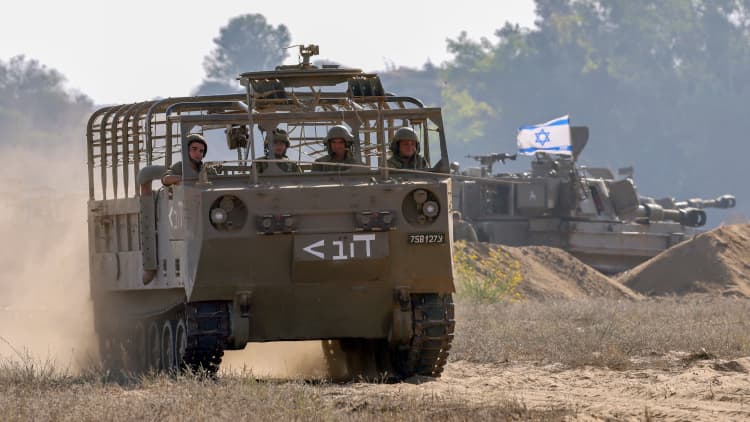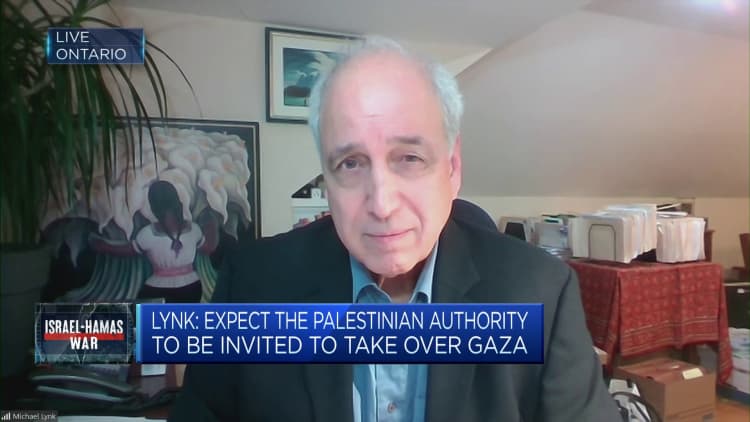The Israel Aerospace Industries pavilion stands empty at the Dubai Airshow 2023 at Al Maktoum International Airport, Dubai, United Arab Emirates on November 14, 2023.
Natasha Turak | CNBC
DUBAI, United Arab Emirates — Amid the bustle and footfall of thousands of visitors and exhibitors at the 2023 Dubai Airshow, one pavilion is notably empty: that of Israel.
During its first-ever Dubai Airshow in November of 2021 following the Abraham Accords, which saw it normalize relations with the United Arab Emirates, Israel was represented by several of its major defense contractors and smaller tech and weapons firms. Its companies’ stands saw no shortage of engagement, with Emiratis and Saudis examining Israeli wares and holding conversation with the firms’ staff, many of whom were in the Gulf for the first time in their lives.
Two years later, and one month into Israel’s war against Hamas in the Gaza Strip, the scene is unrecognizable.
The only visible Israeli representation was a large pavilion for state-owned Israel Aerospace Industries, as well as stands for Elbit Systems Ltd. and Rafael Advanced Defense Systems Ltd. More notable than the pared down presence of Israeli companies was the lack of staff and visitors; the spaces were typically deserted or occupied by unaffiliated airshow visitors who said they were just there to use the free chairs and tables.
On the show’s first day, the IAI pavilion was surrounded by a red cordon, which was removed by the second day.
CNBC attempted to speak to one individual who said they worked for IAI and two who were working at the Elbit Systems stand, but in all cases the individuals declined to comment. IAI and Elbit Systems did not reply to an emailed CNBC request for comment.
CNBC contacted two representatives of Israeli defense firms that attended the airshow in 2021; they said they did not attend this year’s show because they had been drafted into the country’s military.
Meanwhile SIBAT, Israel’s International Defense Cooperation Directorate, canceled its participation; an email from the Israeli Defense Ministry’s media bureau was cited by Defense News prior to the event as saying: “In light of the war that began on Oct. 7, SIBAT has decided not to inaugurate a national pavilion at global defense exhibitions until further notice.”

Contrast that to the statement from IAI CEO Boaz Levy ahead of the 2021 Dubai Airshow, in which he said that “a year after the signing of the Abraham Accords, we are thrilled to participate in the show and to broaden cooperation with business partners in the Gulf region.”
After more than three years of enjoying warming relations with a number of Arab states — normalization deals with Bahrain, Morocco and Sudan followed that with the UAE — and in the midst of U.S.-brokered talks over a potential normalization with Saudi Arabia, tensions between Israel and the rest of the Middle East are once again high.
Israel’s military response to the Oct. 7 terrorist attack by the Palestinian militant group Hamas, an attack that killed 1,200 people and took some 240 hostage, has drawn vocal condemnation from much of the world, including those new Arab allies.
As of Nov. 14, Israel’s air and land offensive against the Gaza Strip, which is governed by Hamas, has killed more than 11,000 people, according to Palestinian health officials. The United Nations has warned that time is running out to “prevent genocide and humanitarian catastrophe” in the besieged enclave, which had already been under Israeli blockade since 2007.

In late October, as Israel’s ground operation got underway in Gaza, the UAE condemned the developments and “expressed its deep concern over the Israeli military escalation and exacerbation of the humanitarian crisis that threatens more loss of civilian lives.”
A majority of countries in the U.N. General Assembly have called for a humanitarian cease-fire, and Arab states have roundly condemned Israel’s actions. The Israeli government says its operations are necessary to eliminate Hamas and defend itself, and it denies deliberately targeting civilians, saying that Hamas uses them as human shields.
UAE leaders have repeatedly condemned Israel’s actions and called for a cease-fire, though have made no indication of intent to sever ties with the Jewish state. Following the signing of the Abraham Accords in August 2020, the two nations pledged billions of dollars in cross-border investment and cooperation, particularly in the areas of defense, technology and tourism.
UAE national airline Etihad and Dubai-based low-cost carrier FlyDubai continue to operate flights to Tel Aviv, though the airlines have reduced the volume of those flights. Dubai’s flagship carrier Emirates suspended all its flights to Israel on Oct. 12, citing “the safety of our customers and employees.”
The UAE reportedly aims to be a mediating influence in the conflict, leveraging its relationships with the rest of the Arab world and its close alliance with the U.S., which has military installations and personnel stationed in the country.

